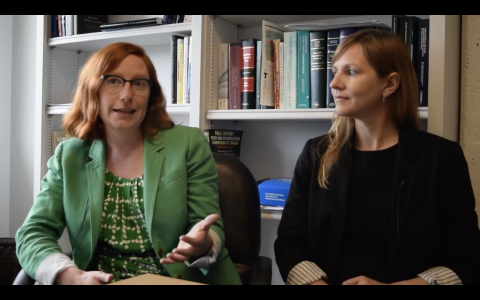
In August 2016, Doctor Gail Henderson of Queen’s Faculty of Law and Doctor Pamela Beach of Queen’s Faculty of Education met at an orientation event for new faculty and chatted briefly about their research interests. That initial meeting resulted in a successful application for a two-year, $67,114 Social Sciences and Humanities Research Council (SSHRC) Insight Development Grant. As both federal and provincial governments push to make financial literacy education a priority, research is crucial to ensuring that its policy goals are met.
The study, titled “This Little Piggy Went Banking: Examining Conflicts of Interest in Financial Literacy Education Resources for Elementary School Teachers,” is the first empirical study focusing on financial education materials produced by the financial industry. “Our primary research question and main policy concern,” explains Henderson, who is the principal investigator on the grant, “is whether these materials emphasize different lessons or different messages than materials from other sources. The expectation of regulators is that financial literacy education can empower financial consumers to make wiser decisions, but that depends on the content of that education.”
The study also looks at how Ontario teachers are incorporating financial literacy into their classrooms, and the extent to which they are doing so. Beach describes teachers as “continuous learners who seek out information through professional development and accessing resources that they might find online or through other sources. It’s important that all teachers have access to the right kind of resources so that they can easily implement ideas into their classroom, they can see the connections, and they know the resources will target financial literacy.”
Learn more about the research from Dr. Beach and Dr. Henderson in their online interview.
The study is being undertaken in three phases.
First, the research team, which includes JD student Lucy Sun, Law’19, will review financial literacy education resources aimed at elementary school students and teachers submitted to the Canadian Financial Literacy Database. This Database is maintained by the Financial Consumer Agency of Canada (FCAC), the regulator responsible for protecting financial consumers.
The second phase will survey Ontario elementary school teachers on whether, in what manner, and with what means they are incorporating financial literacy into their classrooms.
The third and final phase involves more in-depth discussion with a small group of elementary school teachers. This phase will use screen-capture technology and a “think-aloud” methodology to gain insight into how teachers evaluate financial literacy education materials.
These latter two phases also will provide practical feedback to the FCAC about the Database.
The grant funding will provide research assistantships to two PhD students who will be involved in data collection, data analysis, and the dissemination of results.